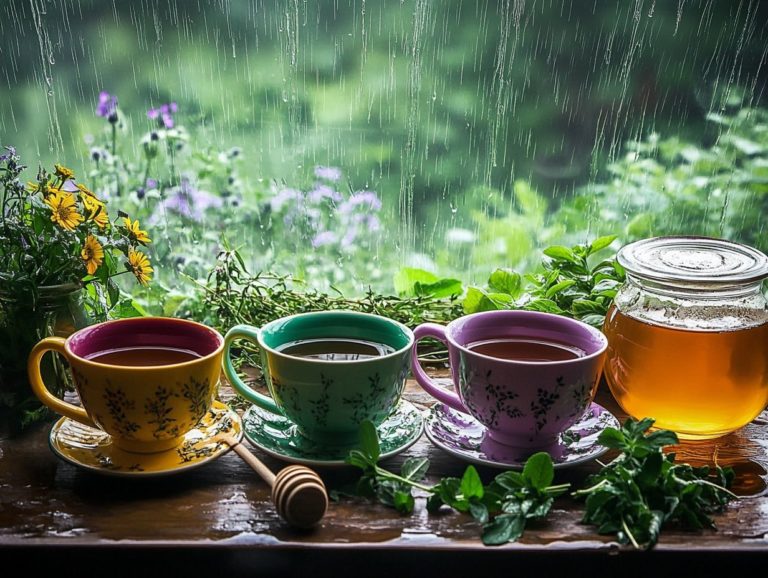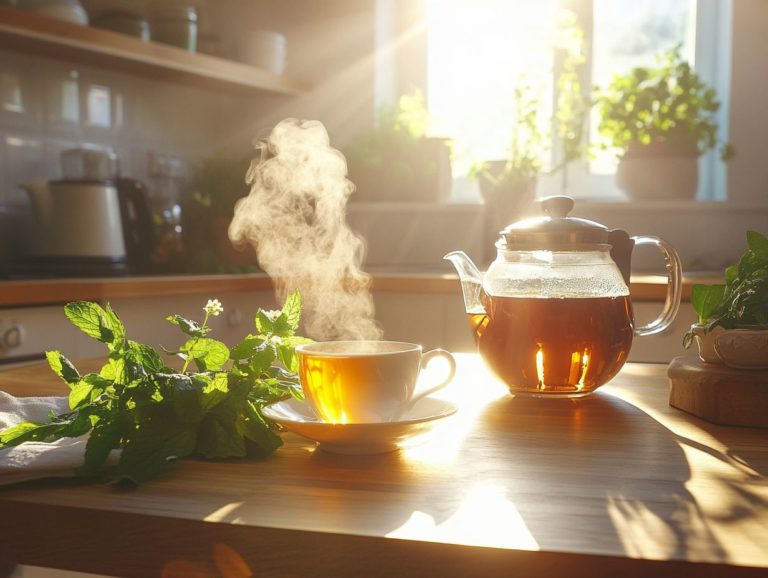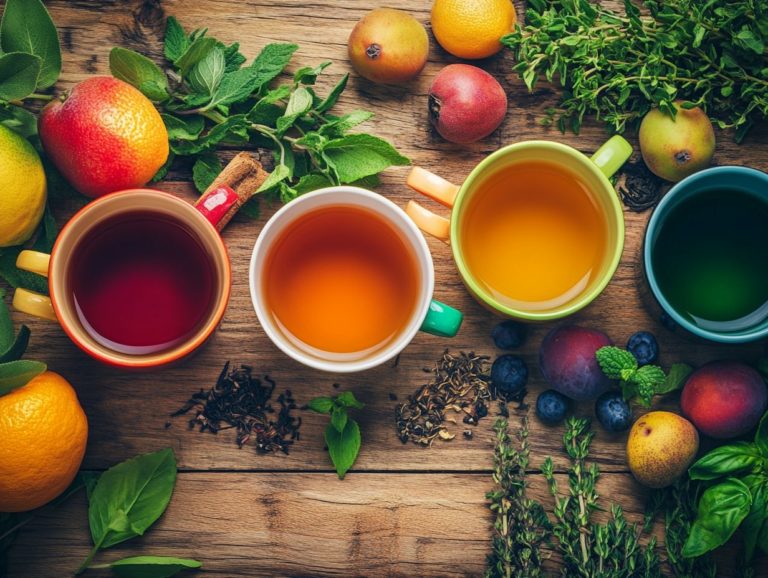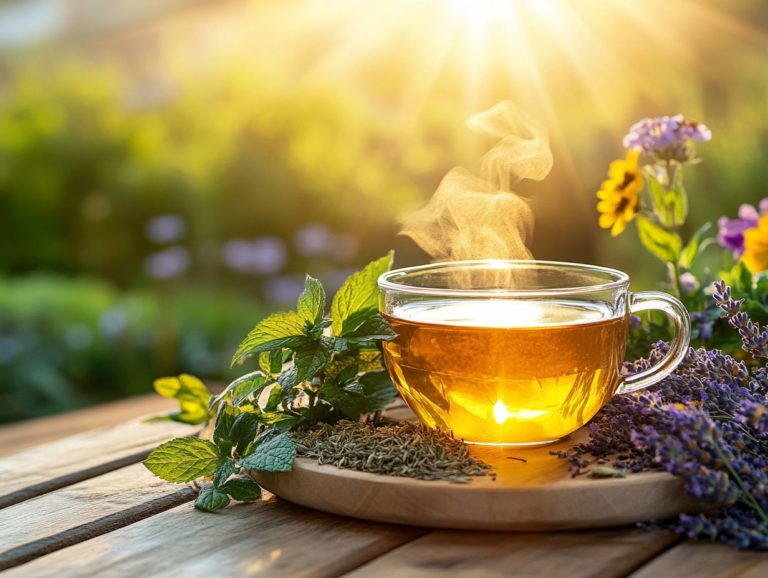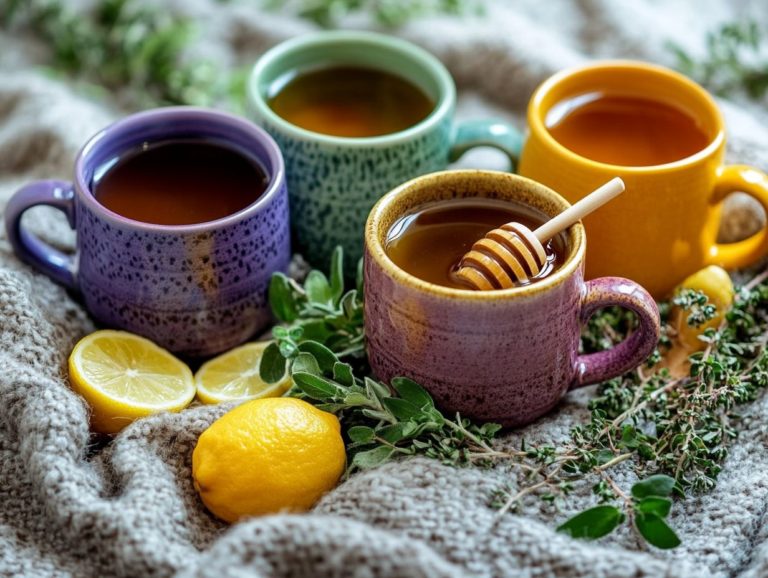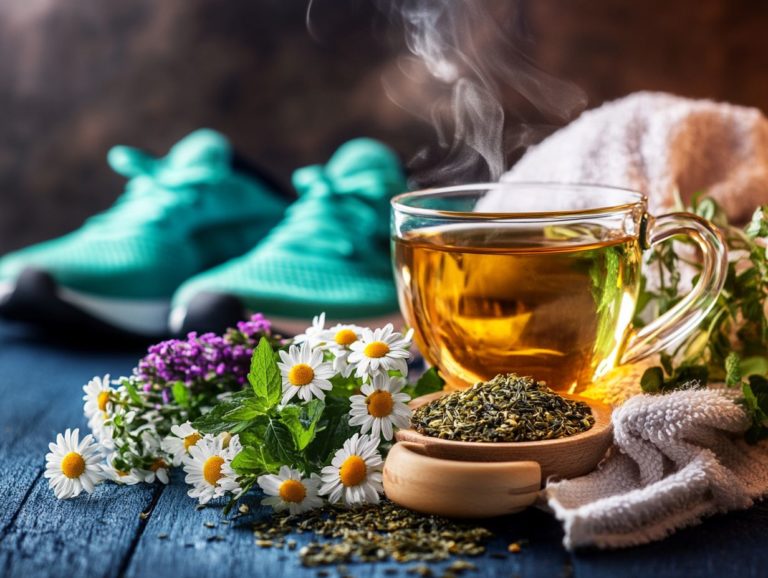Herbal Teas: How to Choose the Right One
Herbal teas have surged in popularity, captivating you not only with their delightful flavors but also with their myriad health benefits. This makes them a better choice for you in beverages.
These enchanting brews provide a natural remedy for various issues, including digestive health and stress relief. They make a wonderful addition to your wellness routine.
However, with such a vast array of options at your fingertips, selecting the right herbal tea or herbal infusion can feel quite daunting.
This article delves into the benefits, highlights the top varieties including chamomile tea and peppermint tea, and offers essential preparation tips for herbal teas, while shedding light on potential risks you should be aware of.
Start your exciting journey to find the perfect herbal tea for your health goals!
Contents
Key Takeaways:
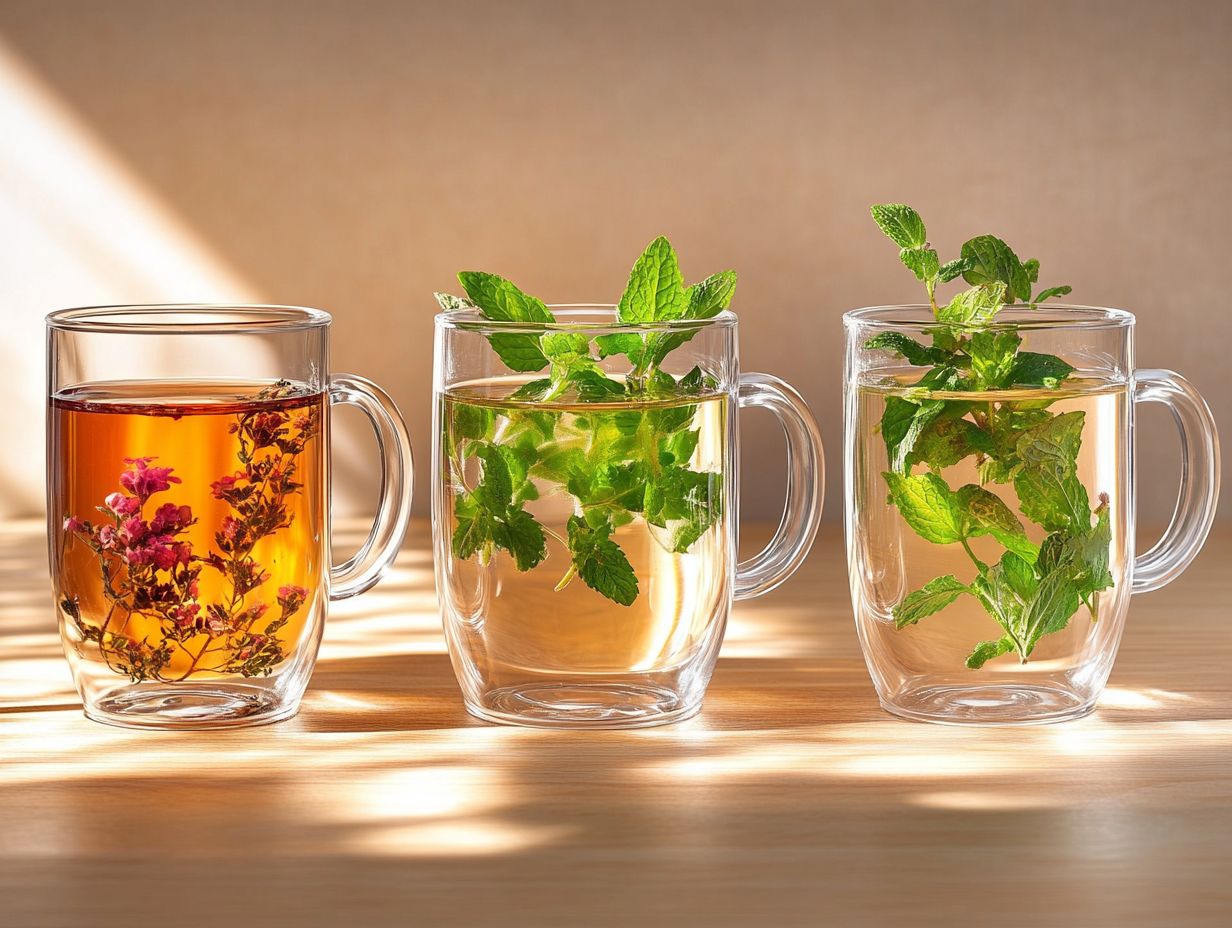
- Herbal teas offer a natural and effective way to improve health and wellness.
- When choosing a herbal tea, consider factors like taste, health benefits, and potential risks.
- Some popular herbal teas include chamomile for relaxation, peppermint for digestion, ginger for immunity, and lemongrass for its refreshing taste.
What are Herbal Teas?
Herbal teas, often referred to as herbal infusions, are delightful beverages crafted from various plants, herbs, flowers, and even spices. They provide a flavorful alternative to traditional tea, with options like chamomile and peppermint being caffeine-free and versatile for enjoyment hot or cold.
Perfect for the health-conscious individual, these herbal brews are packed with a plethora of health benefits, including antioxidants and the ability to promote relaxation.
With a rich history rooted in traditional medicine, herbal teas serve as refreshing drinks and valuable sources of wellness.
Unlike traditional teas derived from the Camellia sinensis plant, herbal infusions, such as cleansing tea and slimming infusions, can be made from an impressive array of botanicals. Each brings its own unique flavors and potential therapeutic properties. Take hibiscus and blackcurrant, for instance—they offer tart, fruity profiles while delivering antioxidants. For those looking to explore more, check out herbal tea variations that provide creative flavor combinations. Conversely, lemon balm is renowned for its soothing, calming effects.
The preparation methods for herbal teas can be diverse, ranging from steeping dried herbs in boiling water to cold brewing with fresh herbs, resulting in a refreshing aromatic experience. To enhance your skills, learn how to brew perfect herbal infusions. Rich in vitamins and minerals, these herbal concoctions provide hydration and may support digestion, boost immunity, and promote relaxation. They are beloved staples in holistic wellness practices across cultures like Ayurveda.
Benefits of Herbal Teas
Herbal teas present a remarkable array of health benefits, including cleansing and stress relief that enhance your overall wellness. They provide stress relief, promote digestive health, aid in cleansing, and assist with weight management through specially crafted slimming infusions.
Rich in antioxidants, these soothing beverages not only encourage relaxation but also support various bodily functions, making them essential elements of a health-conscious lifestyle.
Improving Health and Wellness
Incorporating herbal teas into your daily routine, especially organic herbal tea options, can truly elevate your health and wellness by tapping into their natural antioxidants and other beneficial compounds. Herbal infusions like cleansing tea and chamomile tea promote relaxation and enhance digestive health, creating a comprehensive approach to well-being.
These delightful beverages pack in flavonoids and plant compounds known for their health benefits, renowned for their antioxidant properties that fight free radicals in your body. Take green tea, for example; it’s celebrated for its metabolism-boosting abilities while also soothing your mind. Meanwhile, peppermint tea, with its calming aroma, works wonders by alleviating stress and supporting digestive functions. To explore more about these teas and their origins, check out the history of herbal tea.
By weaving a variety of these herbal blends, such as peppermint tea and ginger tea, into your lifestyle, you can experience greater overall health. This fosters a sense of tranquility and digestive ease that s truly unparalleled.
Explore our selection of herbal teas today and transform your wellness routine!
Choosing the Right Herbal Tea
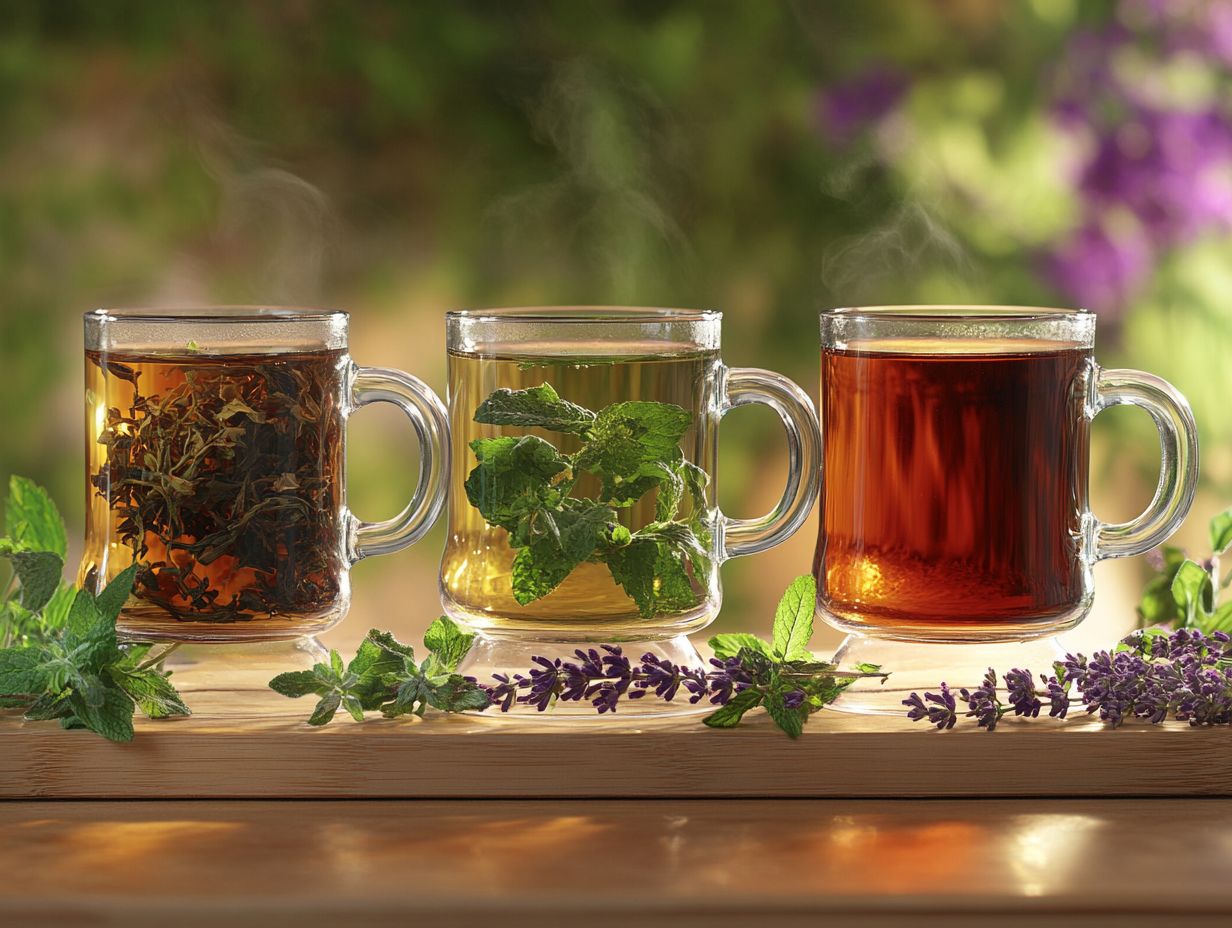
Choosing the perfect herbal tea whether it s caffeine-free or a revitalizing brew requires careful consideration of several factors. These include your personal flavor preferences, desired health benefits, and the quality of ingredients.
Opting for organic herbal tea in eco-friendly packaging benefits your health and is better for the environment. With various options available from soothing chamomile to revitalizing detox blends, familiarizing yourself with different brewing methods can significantly enhance your tea-drinking experience. You can also learn how to make your own herbal tea at home for a personalized touch.
Factors to Consider
When choosing herbal tea, it s essential to consider health benefits, flavor preferences, and brewing methods to ensure each cup brings satisfaction. Whether you prefer loose leaf herbal tea or the convenience of tea bags, understanding the nuances can greatly impact the aroma and taste of your brew.
Consider your individual health goals. Are you seeking relaxation with chamomile or a little boost from ginger tea? Chamomile is famous for its calming properties, making it ideal for a restful night’s sleep. In contrast, peppermint is invigorating and aids digestion, perfect for when you need a pick-me-up. For more options, try delightful DIY herbal teas for wellness.
Your personal flavor preferences guide your decisions. If you enjoy floral notes, hibiscus might appeal to you. It offers a tart, refreshing taste and is packed with antioxidants.
The brewing method you choose significantly impacts your tea s taste. Adjusting steeping times and water temperatures can unlock different flavor profiles from the same herbal blend, enhancing your overall tea experience.
Popular Types of Herbal Teas
Popular types of herbal teas include chamomile, peppermint, ginger, hibiscus, and blackcurrant. Each presents a distinctive flavor profile and a host of health benefits celebrated in traditional medicine, including Ayurveda, for centuries.
These herbal brews not only satisfy a variety of tastes but also meet specific wellness needs, solidifying their status as cherished selections among tea enthusiasts.
Overview and Benefits
Exploring popular herbal teas reveals a delightful array of flavors and health benefits waiting for you to discover. Try sipping chamomile tea for relaxation, enjoying peppermint tea to support digestive health, or indulging in ginger tea for its impressive anti-inflammatory properties. These herbal brews aren’t just trendy drinks; they carry profound histories rooted in traditional medicine, making them invaluable assets to your wellness routine.
For centuries, various cultures worldwide have harnessed the healing potential of these remarkable plants. Chamomile, revered since ancient Egypt, has long been celebrated for its soothing effects on nerves and its ability to promote restful sleep. Meanwhile, peppermint boasts a rich legacy in traditional Chinese herbalism for alleviating upset stomachs. Similarly, ginger has held a prominent place in Ayurvedic practices, cherished for its warming qualities and capacity to boost immunity.
Each cup of herbal tea serves as a comforting beverage and a connection to ancient wisdom. With every sip, you invite holistic solutions into your life, enhancing both your physical and mental well-being. Exploring 5 unique herbal teas from around the world can deepen this experience.
Preparing and Serving Herbal Teas
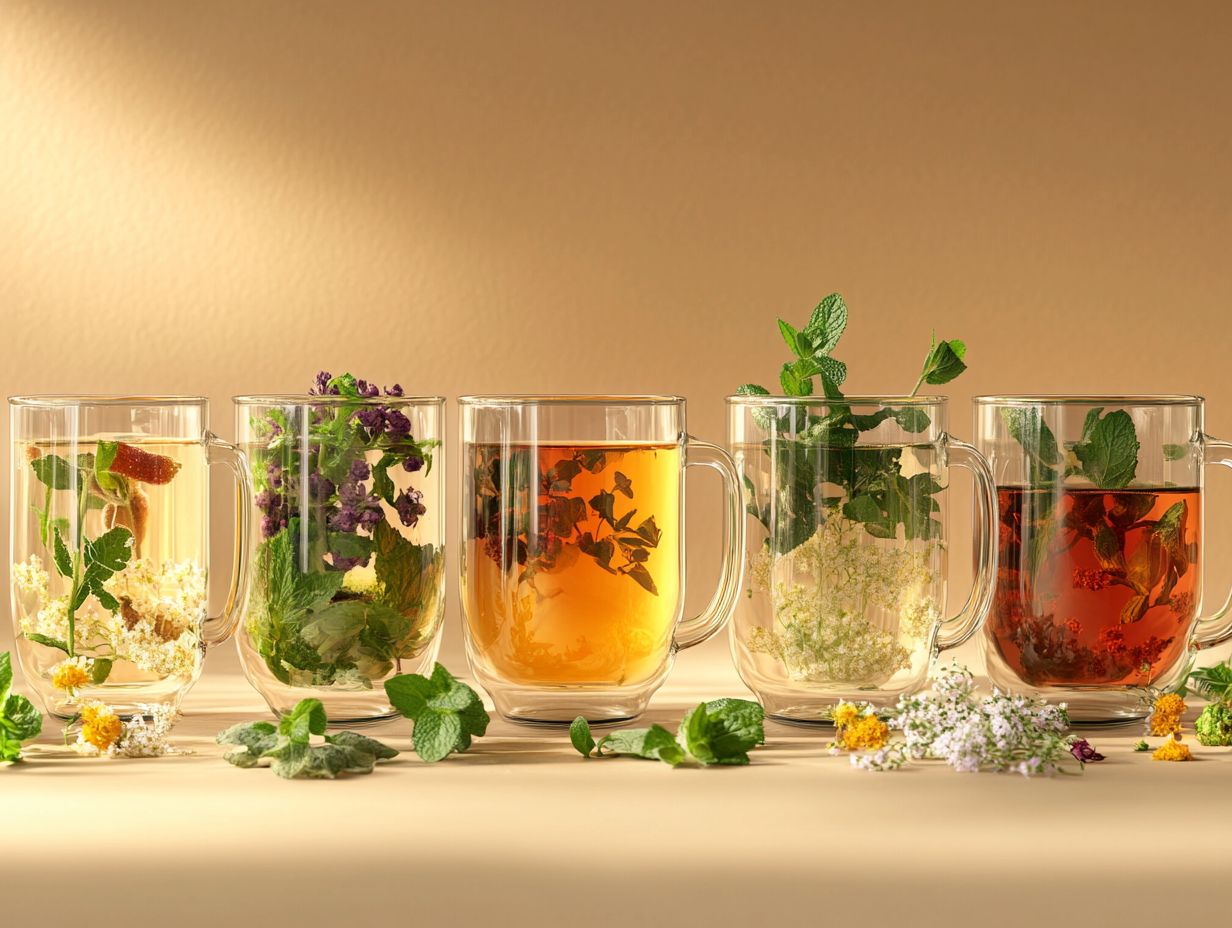
To truly elevate your experience with herbal teas, understanding the nuances of different brewing methods including cold brewing is essential. Select only the finest ingredients, whether you choose loose leaf herbal tea or the convenience of tea bags. This attention to detail enriches flavor and maximizes the health benefits you can derive from each herbal brew.
Best Practices and Tips
To truly unlock the best flavor and health benefits from herbal teas, follow simple tips for brewing and serving, whether you prefer loose leaf herbal tea or tea bags. A few simple techniques can elevate your tea-drinking experience, making it more enjoyable.
Start with the quality of your water. Opting for filtered or spring water can significantly enhance the overall taste. In contrast, tap water might introduce undesirable flavors, diminishing the benefits of your herbal infusion.
Pay attention to steeping time and temperature. These are crucial for releasing the beneficial compounds in your herbal blends. Most herbal teas thrive at temperatures between 200 F and 212 F. For those seeking herbal tea for anxiety relief, steeping times typically range from five to ten minutes, tailored to your personal preferences and the specific herbs used.
When weighing the choice between loose leaf and tea bags, consider their distinct advantages. Loose leaf often delivers a richer flavor profile and a more aromatic experience, while tea bags provide unmatched convenience and portability.
Understanding these nuances not only enriches your tea ritual but also enables you to make informed decisions for your next brew.
Potential Risks and Side Effects
While herbal teas provide a wealth of health benefits, including stress relief and digestive health, be aware of the potential risks and side effects associated with certain herbal infusions, such as chamomile and peppermint. This is especially important when consumed in excess or without appropriate guidance.
Awareness of these factors is essential for anyone who incorporates herbal tea into their health routine or traditional medicine practices, including exploring 5 delicious herbal tea blends to try.
What to Watch Out for
When indulging in herbal teas, it s essential to be mindful of potential risks and side effects. Some herbal infusions might interact with medications or trigger allergic reactions in certain individuals. Being aware of these factors can help ensure a safe and enjoyable experience with herbal teas.
Take chamomile tea, for instance. While it’s celebrated for its calming effects and relaxation, it can cause allergic reactions in those sensitive to plants in the Asteraceae family. For a delightful alternative, consider crafting herbal tea blends for every mood; peppermint tea may also clash with medications that influence liver enzymes.
If you’re taking anticoagulants, proceed with caution when considering ginkgo biloba tea, as it could heighten the risk of bleeding. Ginger tea and lemongrass also offer great benefits for digestive health. Additionally, you might explore 5 herbal teas for better skin health to enhance your overall well-being.
For those who are pregnant or breastfeeding, always consult with healthcare professionals before adding organic herbal tea options like raspberry leaf or nettle to your routine, as their impacts on developing fetuses and infants are still under-researched.
By understanding these considerations, you can make informed and thoughtful choices regarding your herbal tea consumption, including caffeine-free blends that may be better for you and the environment.
Frequently Asked Questions
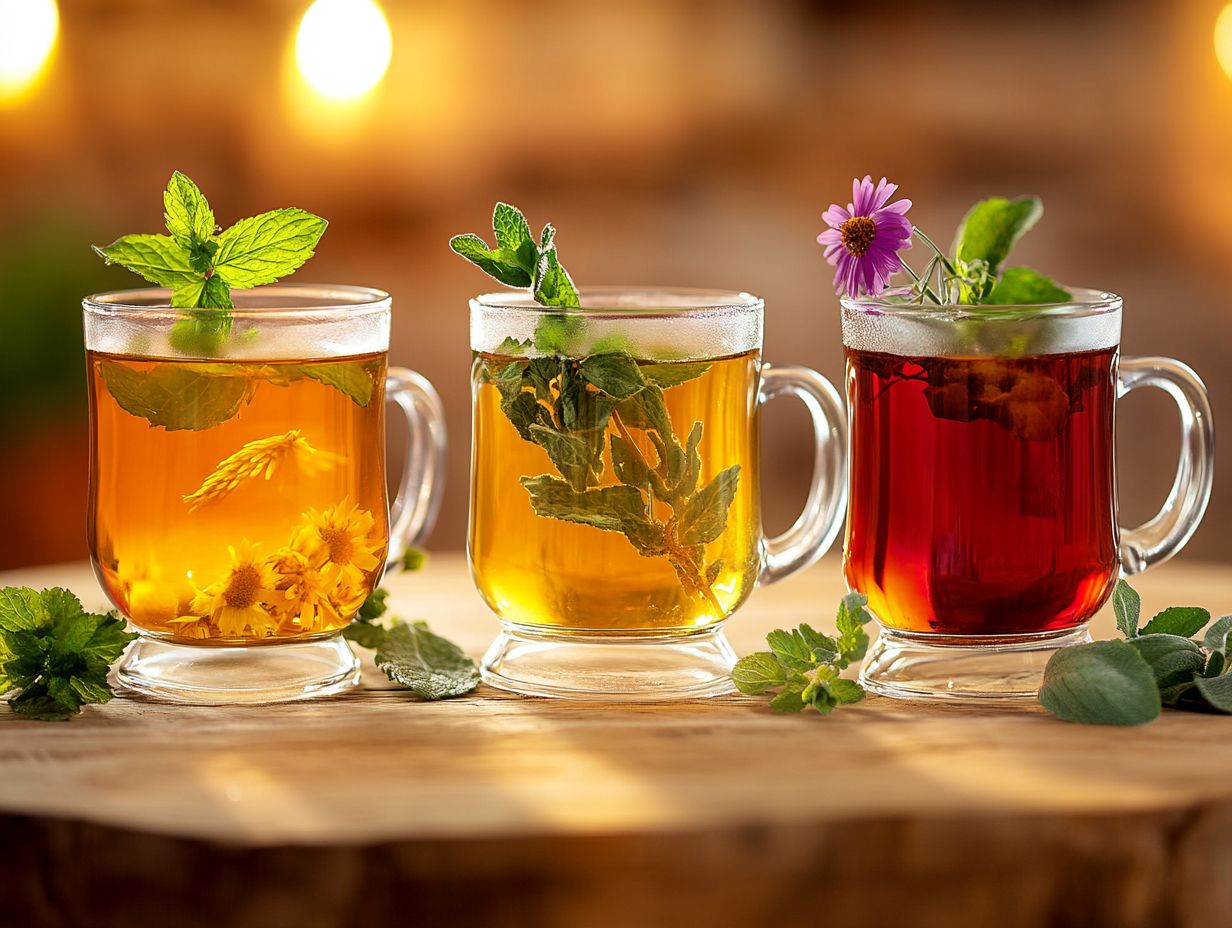
What are herbal teas?
Herbal teas, also known as tisanes (a term for herbal infusions), are beverages made from various plant parts, such as leaves, flowers, roots, and fruits, steeped in hot water. They are caffeine-free and offer a variety of health benefits, including antioxidant properties that are better for you and better for the environment.
Why should I choose herbal teas?
Herbal teas are a great alternative to traditional caffeinated drinks, such as coffee and black tea. They offer a myriad of health benefits, including promoting relaxation, boosting immunity, aiding digestion, and even serving as digestive teas or detox infusions.
How do I choose the right herbal tea for me?
When choosing an herbal tea, consider your personal preferences and the specific health benefits you are looking for. You can also consult with an herbalist or research the different herbs, such as rosemary and turmeric, and their properties to find the perfect blend for your needs. Explore various brewing methods, including tea bags.
Start exploring the world of herbal teas today and discover your favorites!
Do all herbal teas taste the same?
No, herbal teas can have a wide range of flavors. They can be sweet, fruity, earthy, or even bitter. It’s exciting to try various blends to find what delights your taste buds!
Are there any potential side effects of drinking herbal teas?
Herbal teas are generally safe. However, some herbs can interact with certain medications or cause allergic reactions. Consulting with a healthcare professional is wise before adding new herbal teas to your routine.
Can I drink herbal teas during pregnancy?
It’s best to avoid herbal teas during pregnancy. Some herbs, like ginger, might affect fetal development. Always consult your doctor before consuming any herbal tea while pregnant, including chamomile and peppermint tea.

